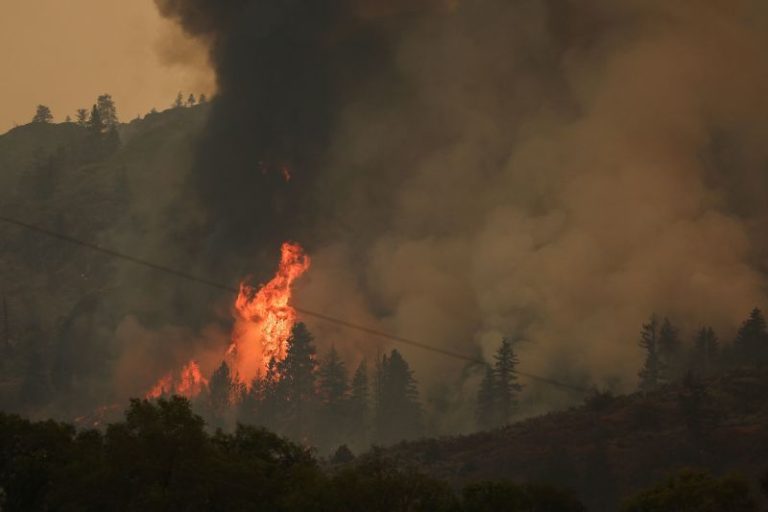An out-of-control blaze burning in northern Washington state exploded in size, crossed the Canadian border and set off a cascade of evacuations over the weekend.
The so-called Eagle Bluff Fire has burned thousands of acres on both sides of the border and forced hundreds to evacuate their homes since it ignited Saturday in Washington’s Okanogan County.
Evacuations were ordered on Saturday for more than 700 properties in the Canadian town of Osoyoos, British Columbia, after the fire crossed the border. By Monday, that number fell to 192 properties after firefighters made progress fighting the fire, with an additional 2,635 properties in the area under an evacuation alert to be ready to evacuate should conditions change.
There are no active evacuation orders for the Eagle Pass Fire in the US, but at least three structures had burned in Okanogan County, Washington, and portions of the county were under a Level 2 evacuation notice – “Be Ready to Evacuate” – according to fire officials.
The fire exploded in size due to dry, warm and breezy conditions and has burned through more than 10,000 acres. At least 3,500 acres have burned in Canada alone. The fire remains completely uncontained in both countries, according to Washington and Canadian fire officials.
Wind gusts are expected to ease over the area by midweek, which could lend a helping hand to firefighters.
The Eagle Bluff Fire is one in a series of large fires that ignited across the Western US in July. At least 64 large fires are currently burning across nine states, according to the National Interagency Fire Center, including the York Fire, which continues to rage in Southern California’s Mojave National Preserve. Still uncontained, that fire has already burned 77,000 acres in California and is closing in on the Nevada border. Weather conditions gave firefighters a slight boost on Sunday night as some rainfall moved through the area and helped slow down fire activity.
The United States’ fire season has been pacing below average in terms of acres burned so far this year. As of July 31, 1.1 million acres have burned across the US in 2023, according to the National Interagency Fire Center – well below the 5.7 million acres that had burned to-date in 2022.
The US wildfire season may pick up pace as August arrives. Much of the Pacific Northwest is dry and hot, which is expected to continue through the summer, leaving room for increasingly dry fuels and easy wildfire spread.
While the US wildfire season has started out slow, that is not the case for Canada, which is in the middle of its worst fire season on record. Hundreds of fires burning across Canada have spread several rounds of hazardous smoke across much of the northern tier of the US this summer.
As of July 26, more than 30 million acres of Canadian land – an area roughly the size of Mississippi – have been scorched by wildfires so far in 2023, according to Environment Canada.
At least three firefighters have died this summer battling Canada’s wildfires, including a blaze in British Columbia known as the Donnie Creek Fire which claimed the life of a firefighter last week.
“I am heartbroken that another firefighter was lost protecting our communities and our province during this devastating wildfire season,” Bruce Ralston, Minister of Forests said in a statement on Saturday.
Before this year, the worst wildfire season in Canada in terms of acres burned occurred in 1989 when more than 18 million acres were scorched, according to the Canadian Interagency Forest Fire Centre.

